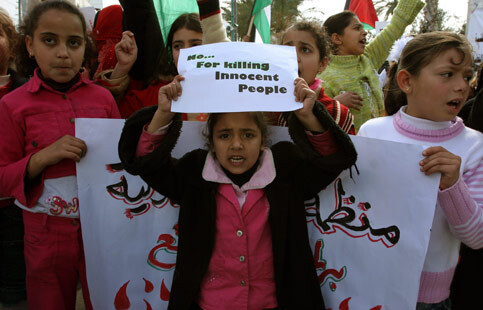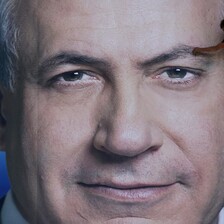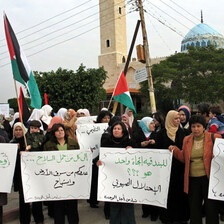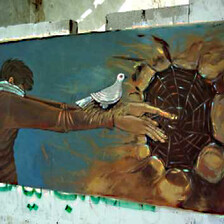Gaza Strip, Palestine 29 January 2007

Palestinian children demonstrate in Gaza City as they protest against the internal fighting between rival factions, 29 January 2007. (MaanImages/Wesam Saleh)
Friday, January 26, 2007
It is an all too familiar sound. Gunfire and explosions echo accross the night in Gaza City. Yet, this evening, once again the sounds are not caused by fighting between the Israeli military and the Palestinian militants.
Instead it is Hamas and elements from Fateh and some of the associated criminal fraternity who are fighting. Tonight all of Gaza is in flames. Every street, every area, is consummed in what can only be described as a civil war between the main two factions here.
At eight-thirty we leave a friend’s house to return to the area where I am staying, Tel al Howa in Gaza City. It is a largely middle class area but riddled throughout with the homes of prominent Hamas and Fateh leaders, as well as the headquarters of the ineptly named ‘Preventative Security’.
Majdi and I try to navigate the streets with care. We approach each corner slowly, stopping to see if there is fighting. The streets are empty, we can hardly find anyone to ask “is this street safe or not?”
Majdi is a vetern of two intifadas (in that he has lived through them). I trust him — I would put my life in his hands. Which is fortunate, because that’s where it lies. The sandy streets of Tel al Howa are the centre of the clashes and we are trying to go in to the very heart of it.
While we drive along a street he turns on the light in the car so anyone looking can see we are not armed. When we come to the corner he flicks it off so that we can see what is happening on each street. We go, turn back, turn right, reverse again, turn left. At a certain point on each street junction we can not go any further. There are literally bullets flying overhead. Far or near we can not tell, but we can hear them.
Each time we hear a gunshot we jump in the car, each time thinking that we are goners. Never before in Gaza he says, has the fighting been like this — all over the Strip.
We have long decided to go to his house instead of our final destination. The problem, now, is to get out of the labarynth of shooting.
We turn one corner in the direction of the sea; blocked by sand and empty pillboxes. We reverse — it’s all happening in slow motion. That’s probably because in the sand we can’t drive quickly enough. The light goes on, goes off, goes on. “Salaam alaykum, fi meshakil fi haada issha’are?” (Are there problems on this street?)
Our directions are always contradictory; we never really know which way to turn because it appears there are problems on every street.
We are surrounded by houses and apartment blocks but no lights can be seen. No one wants to be seen, to be targeted — to be the ‘lucky strike.’
This is the syptom of power — that, those without suffer at its behest. In the middle of these internal clashes Palestinian civilians are caught, wondering: what to do, how to escape?
The explosions intensify and then relax, the gunshots can be heard from all directions and we keep on turning, wondering where a gap will open for us to escape. Eventually, we find one. We head off down the sea road in the direction of relative safety.
“Ilhamdulilah salama” Majdi says when we arrive (‘thank god for your health’, said to people who have beaten an illness or returned from a journey.)
Now, we sit. The phones here are buzzing, “Abu Khaled, how is it with you?” “Khalil what’s happening in your area?” “Are there problems near you, Ahmed?” The answer is always the same.
It is hard to know how we, as internationals, as an international NGO, should respond to this. We have, of course, a clear obligation to ensure that civilians are protected. But we have a clear obligation, also, to protect democracy — Palestinian democracy is being undermined by sanctions imposed on the Hamas government (which, incidentally ‘celebrated’ one year since its election only yesterday.) And, we have a clear obligation to uphold the other aspects of international law which are being violated in the Occupied Palestinian Territory including the war crimes committed by the Israeli occupation. We have an obligation to work for justice and to speak the truth to power.
But most of all we have an obligation to carry hope and to provide the most vulnerable in society with a slice of it. But in Gaza hope is a scarce commodity, available only for the few not for the many.
Eoin Murray is a Programme Officer for Trocaire.
Related Links





